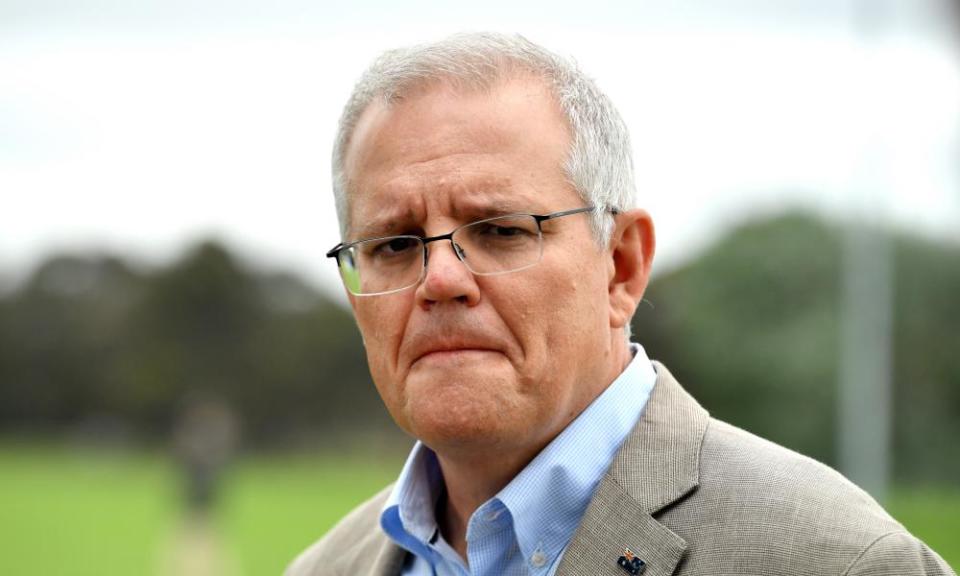Morrison caps off a wild week in parliament with a unifying bout of troll-busting

Scott Morrison, at the end of a wild penultimate parliamentary sitting week, looked to change the conversation on Sunday, hoping that something fresh to talk about may be a prelude to calmer times.
Rather than agonising over the wildness of his own MPs, Morrison sought refuge in the wildness of social media. The prime minister flagged new powers forcing global social media giants “to unmask anonymous online trolls” in a move he characterised as “world-leading”.
Let’s begin with a couple of affirmations. The first is the Morrison government has been attentive to negative trends in the digital badlands, intervening, for example, to force Google and Facebook to negotiate a fair payment with news organisations for using their content in Facebook’s news feed and Google’s search.
Related: Twitter says any move by Australia to ban anonymous accounts would not reduce abuse
The second thing to acknowledge is this policy terrain is profoundly important. Platform-accelerated cultural corrosion is one of the greatest challenges liberal democracies face. Proliferating misinformation and disinformation and the algorithms that reward conflict, sensationalism, and the global promulgation of wild theories, are the cancer of the digital age.
On Sunday, Morrison zeroed in on abuse and calumny on social media. Under his proposal, Twitter and Facebook would be considered publishers and held liable for defamatory comments posted on their platforms unless they could identify the trolls hurling the abuse, in which case, the troll was in the frame.
Obviously abuse, and the febrile intolerance it breeds, is dangerous. But it’s a subset of a much bigger problem. There are also very obvious questions about whether or not Morrison’s proposal is actually workable in practice.
Morrison has been bumping to Sunday’s landing point in increments. But it really wasn’t that long ago that the same government now insisting the platforms are publishers thought (and said) the opposite.
As recently as August 2019, the communications minister Paul Fletcher (strangely absent from Sunday’s announcement) was running a mile from that proposition. He insisted a digital platform was “a different kind of business to a traditional media organisation that has editorial obligations”.
The Nationals MP Anne Webster (who had a truly dreadful experience with a troll) flagged in 2020 pursuing her own private member’s bill because she was having significant trouble persuading senior figures in the government to take on the platforms and require them to exercise editorial responsibility for defamatory content and bullying.
But the roadblocks seem to have been cleared.
The urgency of the prime minister’s zeitgeist hunting on a football field in the southern suburbs of Canberra on Sunday could lead a person to conclude he was racing in the direction of the parliament as we enter what could be the last sitting week before the federal election armed with the necessary troll-busting legislation.
But that doesn’t seem to be the case. Morrison flagged that an exposure draft would be made public sometime during the coming week, and then there would be a bunch of consultation with stakeholders.
It was a similar story with the government’s integrity commission legislation. One of Morrison’s own backbenchers thought resolving that issue was important enough to cross the floor last week.
But Morrison made it clear on Sunday the government’s roundly criticised integrity commission proposal was only coming to the House of Representatives if Labor was prepared to back it.
Related: Scott Morrison digs in over federal Icac – and tries to shift blame to Labor for slow progress
Let me repeat, this could be the last sitting week before an election, and the Morrison government is still dragging its heels on the anti-corruption body it promised voters it would deliver three years ago, and it hopes it can get away with blaming Labor for failing to present its own legislation to the parliament.
It is also not clear that Morrison’s religious discrimination legislation (that began life as a religious freedom package about the same time as the integrity commission went on to the production line, before morphing into an anti-discrimination package) will pass the lower house either, or whether that will remain on ice until after a parliamentary inquiry.
Liberal moderates including MPs Dave Sharma and Trent Zimmerman and senator Andrew Bragg have called for protections for gay teachers and students to be brought forward, not delayed 12 months to wait for an Australian Law Reform Commission review of discrimination laws.
While much is in flux, this much is clear.
The government really does want to pass its controversial voter ID legislation this week. With that package, it is either pass this week or bust.
While senior government figures are hopeful the rebel alliance in the Senate might return to the fold this week, it is not yet clear whether Liberal senators will end their strike. Liberals Gerard Rennick and Alex Antic have said they won’t vote with the government on passing government legislation until Morrison does something about mandatory vaccinations.
Sam McMahon, the Country Liberal Northern Territory senator, has also warned she “might not be able to vote” for the voter ID laws, citing “concerns about how they’re going to impact, particularly Indigenous territorians”.
That’s before you get to the Senate crossbenchers, who may or may not be willing to say yes to that legislation this week.
Morrison may crave tranquility, but the wild abounds.

 Yahoo Finance
Yahoo Finance